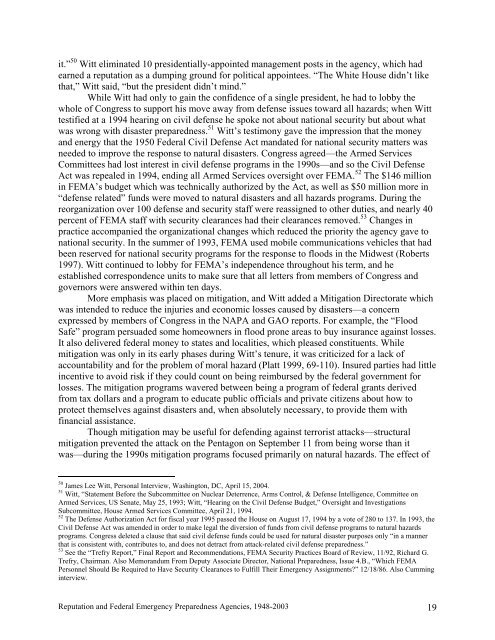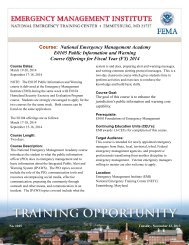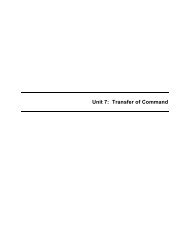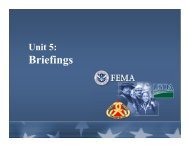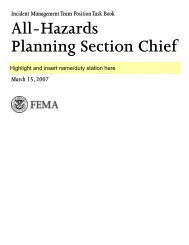Reputation and Federal Emergency Preparedness Agencies, 1948
Reputation and Federal Emergency Preparedness Agencies, 1948
Reputation and Federal Emergency Preparedness Agencies, 1948
Create successful ePaper yourself
Turn your PDF publications into a flip-book with our unique Google optimized e-Paper software.
it.” 50 Witt eliminated 10 presidentially-appointed management posts in the agency, which had<br />
earned a reputation as a dumping ground for political appointees. “The White House didn’t like<br />
that,” Witt said, “but the president didn’t mind.”<br />
While Witt had only to gain the confidence of a single president, he had to lobby the<br />
whole of Congress to support his move away from defense issues toward all hazards; when Witt<br />
testified at a 1994 hearing on civil defense he spoke not about national security but about what<br />
was wrong with disaster preparedness. 51 Witt’s testimony gave the impression that the money<br />
<strong>and</strong> energy that the 1950 <strong>Federal</strong> Civil Defense Act m<strong>and</strong>ated for national security matters was<br />
needed to improve the response to natural disasters. Congress agreed—the Armed Services<br />
Committees had lost interest in civil defense programs in the 1990s—<strong>and</strong> so the Civil Defense<br />
Act was repealed in 1994, ending all Armed Services oversight over FEMA. 52 The $146 million<br />
in FEMA’s budget which was technically authorized by the Act, as well as $50 million more in<br />
“defense related” funds were moved to natural disasters <strong>and</strong> all hazards programs. During the<br />
reorganization over 100 defense <strong>and</strong> security staff were reassigned to other duties, <strong>and</strong> nearly 40<br />
percent of FEMA staff with security clearances had their clearances removed. 53 Changes in<br />
practice accompanied the organizational changes which reduced the priority the agency gave to<br />
national security. In the summer of 1993, FEMA used mobile communications vehicles that had<br />
been reserved for national security programs for the response to floods in the Midwest (Roberts<br />
1997). Witt continued to lobby for FEMA’s independence throughout his term, <strong>and</strong> he<br />
established correspondence units to make sure that all letters from members of Congress <strong>and</strong><br />
governors were answered within ten days.<br />
More emphasis was placed on mitigation, <strong>and</strong> Witt added a Mitigation Directorate which<br />
was intended to reduce the injuries <strong>and</strong> economic losses caused by disasters—a concern<br />
expressed by members of Congress in the NAPA <strong>and</strong> GAO reports. For example, the “Flood<br />
Safe” program persuaded some homeowners in flood prone areas to buy insurance against losses.<br />
It also delivered federal money to states <strong>and</strong> localities, which pleased constituents. While<br />
mitigation was only in its early phases during Witt’s tenure, it was criticized for a lack of<br />
accountability <strong>and</strong> for the problem of moral hazard (Platt 1999, 69-110). Insured parties had little<br />
incentive to avoid risk if they could count on being reimbursed by the federal government for<br />
losses. The mitigation programs wavered between being a program of federal grants derived<br />
from tax dollars <strong>and</strong> a program to educate public officials <strong>and</strong> private citizens about how to<br />
protect themselves against disasters <strong>and</strong>, when absolutely necessary, to provide them with<br />
financial assistance.<br />
Though mitigation may be useful for defending against terrorist attacks—structural<br />
mitigation prevented the attack on the Pentagon on September 11 from being worse than it<br />
was—during the 1990s mitigation programs focused primarily on natural hazards. The effect of<br />
50 James Lee Witt, Personal Interview, Washington, DC, April 15, 2004.<br />
51 Witt, “Statement Before the Subcommittee on Nuclear Deterrence, Arms Control, & Defense Intelligence, Committee on<br />
Armed Services, US Senate, May 25, 1993; Witt, “Hearing on the Civil Defense Budget,” Oversight <strong>and</strong> Investigations<br />
Subcommittee, House Armed Services Committee, April 21, 1994.<br />
52 The Defense Authorization Act for fiscal year 1995 passed the House on August 17, 1994 by a vote of 280 to 137. In 1993, the<br />
Civil Defense Act was amended in order to make legal the diversion of funds from civil defense programs to natural hazards<br />
programs. Congress deleted a clause that said civil defense funds could be used for natural disaster purposes only “in a manner<br />
that is consistent with, contributes to, <strong>and</strong> does not detract from attack-related civil defense preparedness.”<br />
53 See the “Trefry Report,” Final Report <strong>and</strong> Recommendations, FEMA Security Practices Board of Review, 11/92, Richard G.<br />
Trefry, Chairman. Also Memor<strong>and</strong>um From Deputy Associate Director, National <strong>Preparedness</strong>, Issue 4.B., “Which FEMA<br />
Personnel Should Be Required to Have Security Clearances to Fulfill Their <strong>Emergency</strong> Assignments?” 12/18/86. Also Cumming<br />
interview.<br />
<strong>Reputation</strong> <strong>and</strong> <strong>Federal</strong> <strong>Emergency</strong> <strong>Preparedness</strong> <strong>Agencies</strong>, <strong>1948</strong>-2003 19


